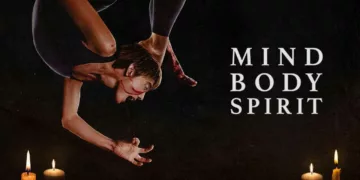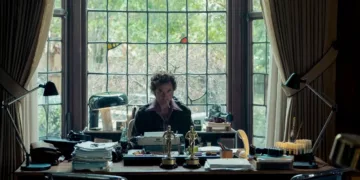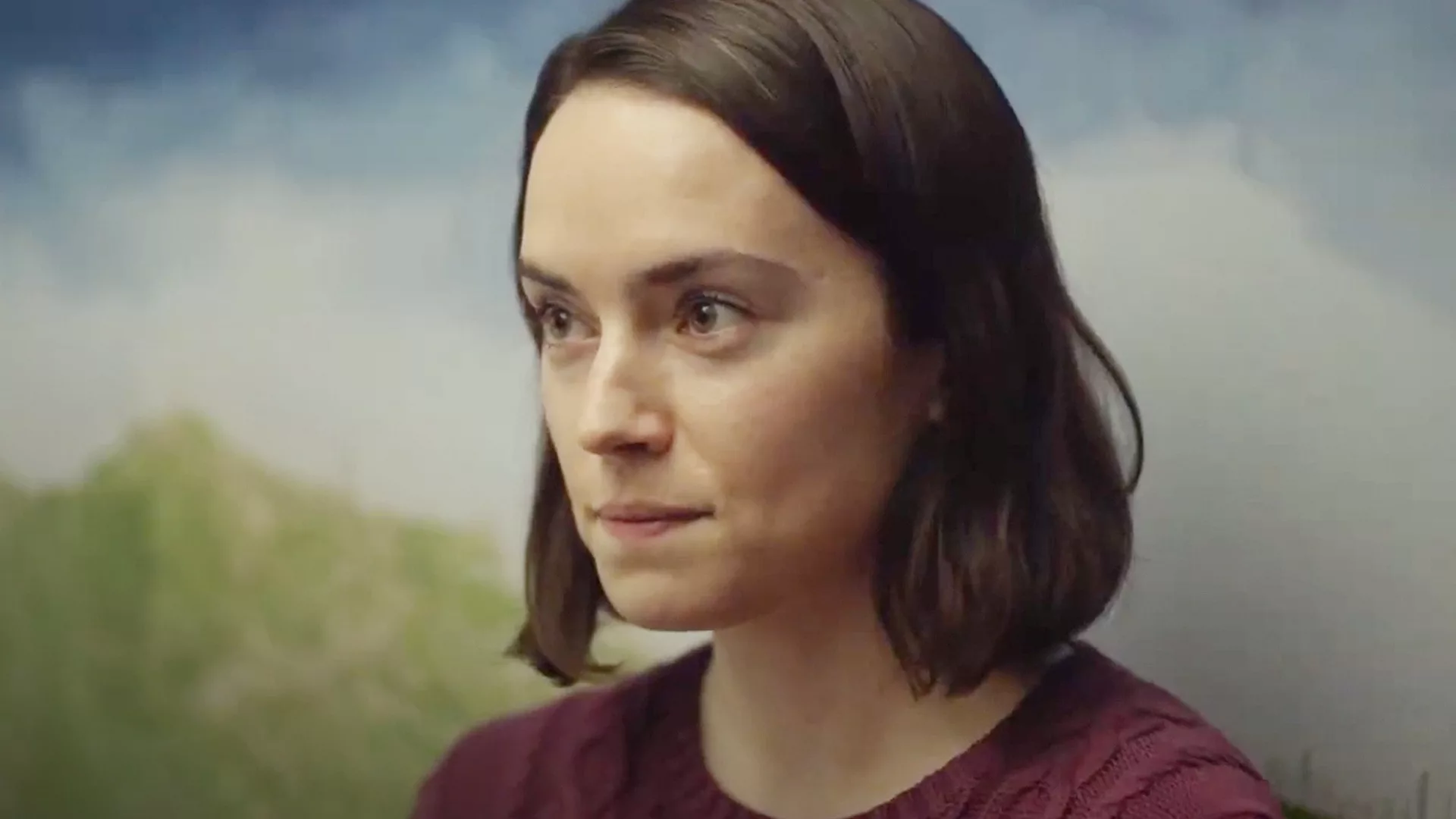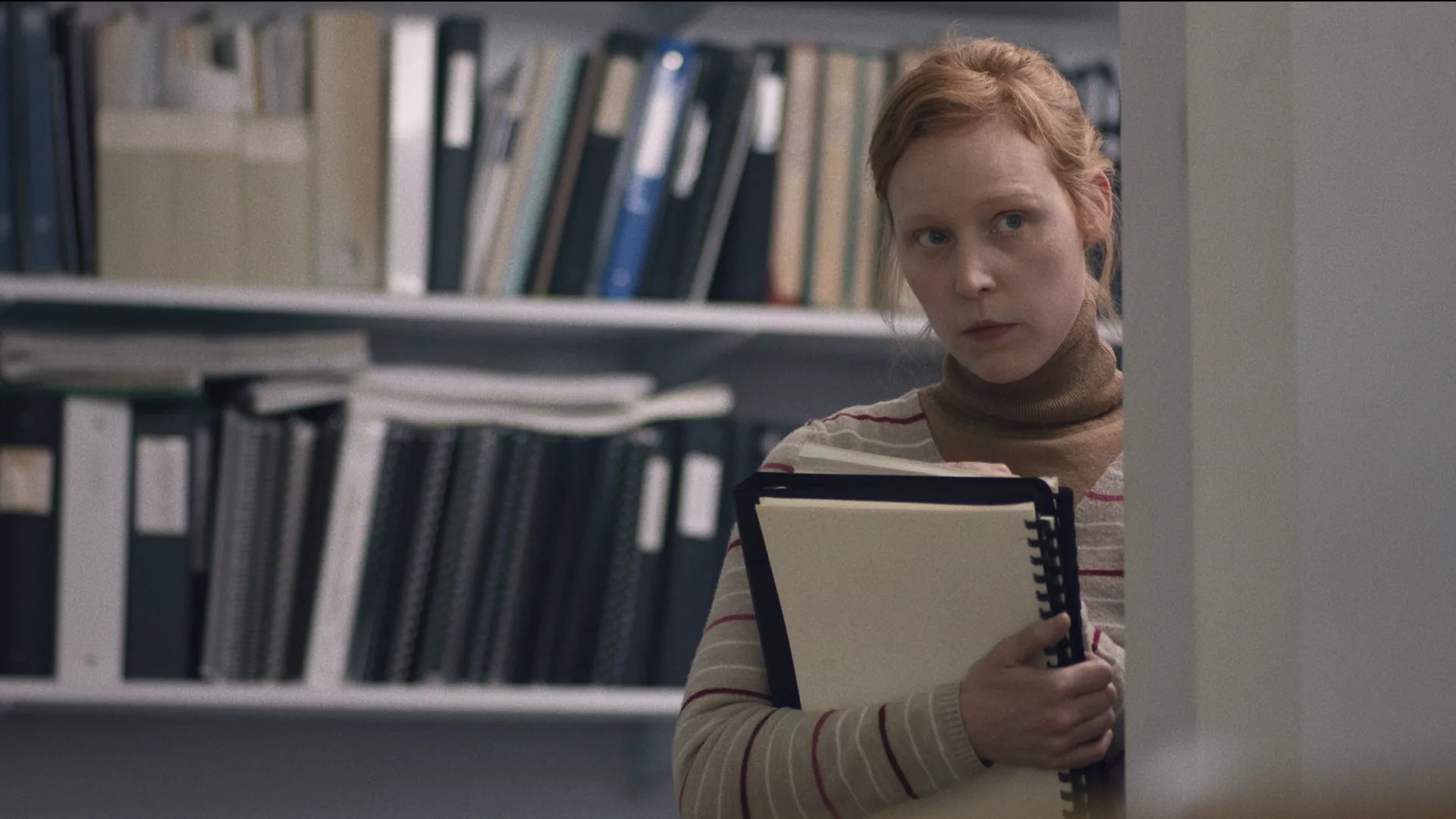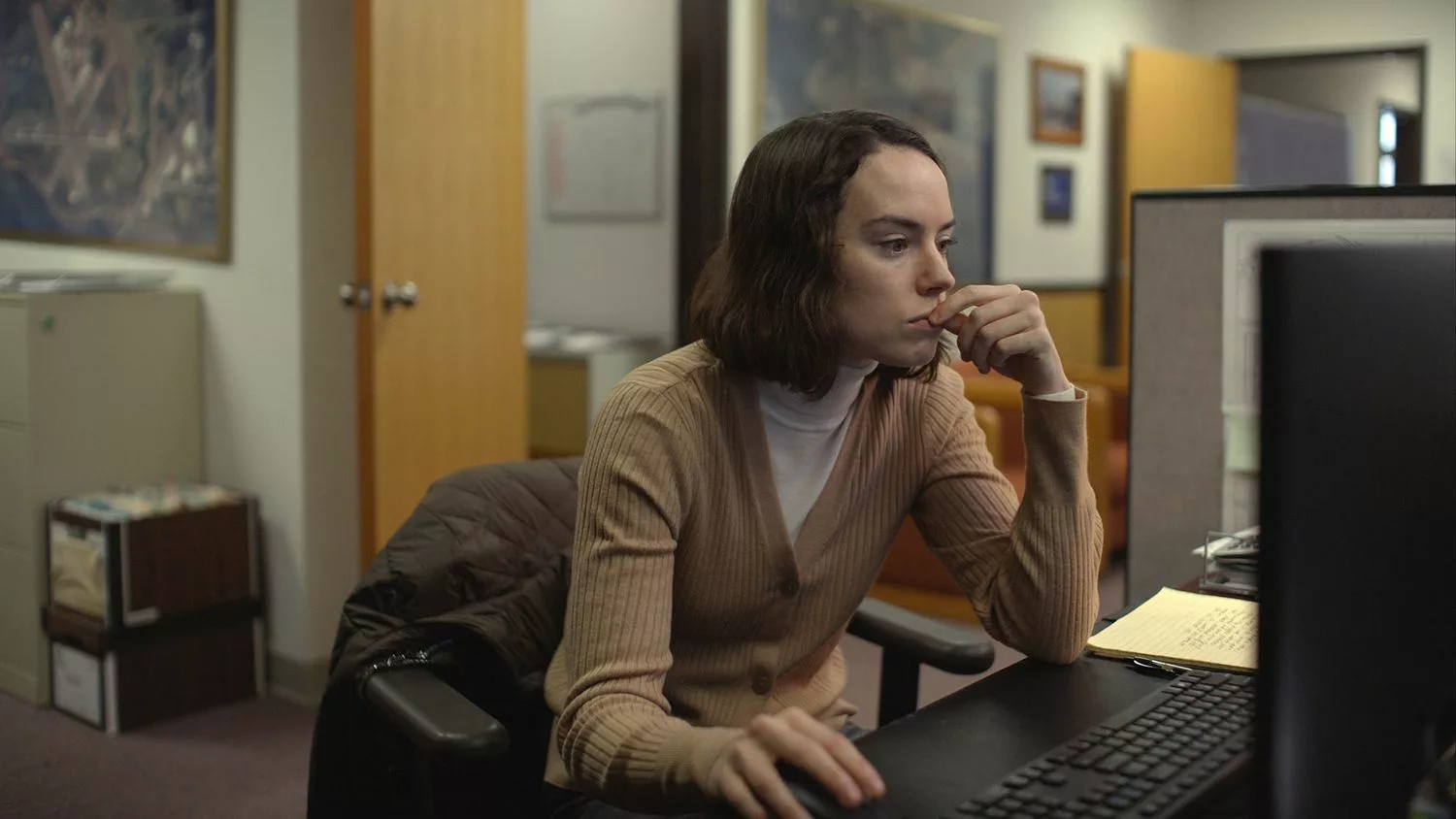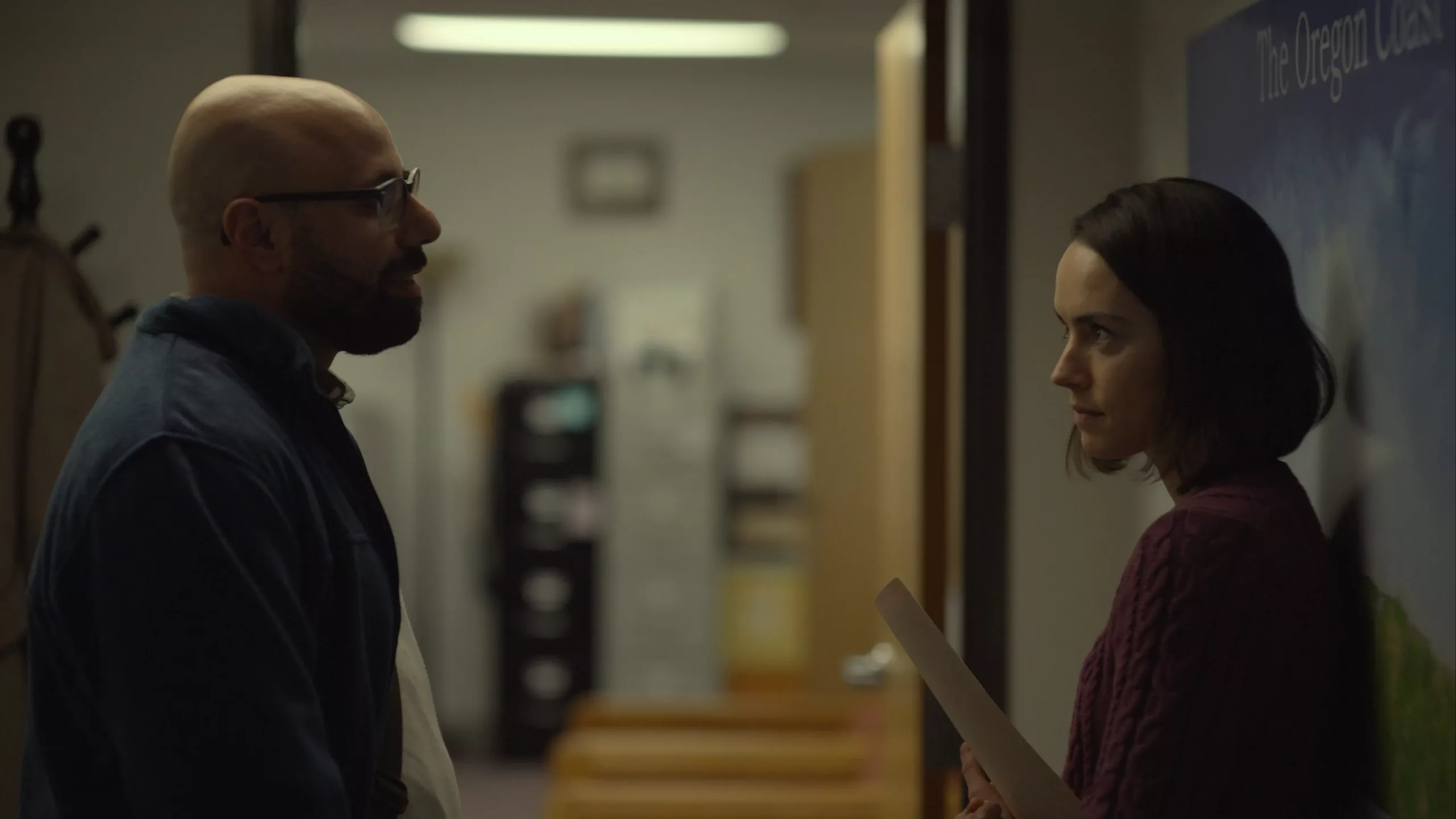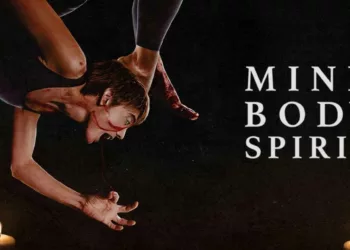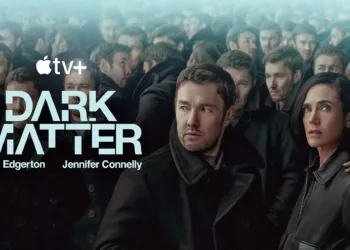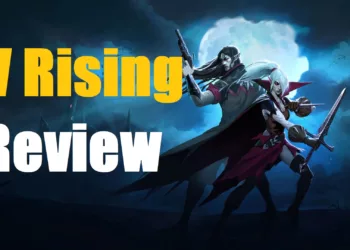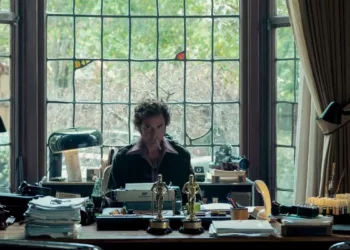Sometimes I Think About Dying offers a quiet character study of Fran, an introverted office worker prone to imagining her own death as an escape from her monotonous small-town life. Director Rachel Lambert slowly reveals Fran’s inner world through subtle details and surreal fantasy sequences rather than traditional plotting. At its heart, the film explores themes of loneliness, social anxiety, and the struggle to form human connections.
We follow Fran (Daisy Ridley) through her dull daily routine of spreadsheets and awkward office interactions in rainy coastal Oregon. The perpetually beige-clad Fran retreats into bizarre daydreams of herself as a corpse in various states of decay, but the arrival of charming new co-worker Robert (Dave Merheje) awakens in her a new willingness to engage. Their nascent friendship forces Fran to open up and make herself vulnerable even as she grapples with intimacy issues rooted in childhood trauma.
While light on plot, Sometimes I Think About Dying offers profound insights into the quiet desperation of those who feel unable to connect, and the courage required to let others see us as we truly are. Carried by Ridley’s subtle yet affecting performance, Lambert has crafted an emotionally resonant meditation on loneliness, isolation, and the saving power of being understood.
Getting Inside Fran’s Head
At first glance, Fran seems to simply drift through life. She shuffles silently from her nondescript apartment to her bland office job and back again, barely speaking or making eye contact. But inside her head, Fran’s imagination runs wild with vivid visions of her own death.
We gradually get glimpses of the complex inner world behind Fran’s impassive exterior. Though she envisions herself in increasingly macabre fantasy death scenarios, Fran doesn’t actually seem suicidal. Rather, these surreal daydreams represent her desire to escape the mundane routine of small-town life. They’re also her only real creative outlet, hinting at untapped depths beneath her meek surface.
In lesser hands, Fran could easily become just another archetypal awkward girl. But Daisy Ridley infuses the role with subtle shades of trauma and romantic longing. Through slight furrows of her brow or fleeting winces, Ridley suggests Fran wasn’t always so closed-off. Hints about her estranged relationship with an abusive mother offer insight into what shaped Fran’s alienating social anxiety.
Yet when Fran tentatively engages with her affable new coworker Robert, flashes of light enter Ridley’s eyes. Her posture softens, her voice loses its monotone as she savors their connection. Ridley captures both Fran’s skittishness about intimacy and her buried need for affection with insightful nuance. In Ridley’s capable hands, Fran becomes a fully-realized portrait of loneliness that elicits our compassion.
“Experience the complexities of family dynamics in our Dying review. Matthias Glasner’s sprawling drama-comedy hybrid takes you on a rollercoaster of emotions, exploring themes of mortality and dysfunction.”
Capturing the Hazy Melancholy
Sometimes I Think About Dying establishes a hazy, melancholic tone right from its opening shots. Filmed on location in rainy coastal Oregon, the story resides in a sleepy fishing town perpetually shrouded in gray. Cinematographer Dustin Lane makes poetic use of the misty locale with beautifully framed images of brooding forests, cold empty beaches, and rain-slicked streets.
Much like its setting, Fran sees the world through a melancholy filter. Her fantasy death sequences take on a wistful, almost romanticized aesthetic. Director Rachel Lambert shoots these surreal visions with a dreamy detachment, as Fran calmly contemplates bugs crawling over her serene corpse.
The office scenes feel intentionally drained of color and energy as well. Lambert often locks the camera into static medium shots watching characters have banal conversations, evoking the smothering tedium of Fran’s routine. Yet even amidst the drab beige cubicles, glimmers of lyricism emerge in small moments, like sunlight breaking through clouds.
Through muted visuals mirroring Fran’s muted inner state, Sometimes I Think About Dying creates an immersive mood of quiet longing. The film becomes an understated tone poem about the hidden inner lives glimpsed beneath placid exteriors. Its hazy melancholy lingers like coastal fog.
An Awakening Connection
Robert’s friendly overtures towards Fran offer her first real human connection in what seems like ages. Though initially skeptical, Fran tentatively engages with gentle encouragement from Robert. He doesn’t pry into her past or personality, but simply makes space for Fran to open up organically.
A playful trip to see a cheesy horror movie acts as their icebreaker, punctuated by a trip to grab a slice of pie where conversation starts flowing naturally. An impromptu office party murder mystery game night later showcases Fran’s previously unseen silly, creative side coming out of its shell.
Daisy Ridley and Dave Merheje cultivate an offbeat, awkward chemistry that often feels more authentic than traditional onscreen romances. We root for these two lonely souls to nurture the special bond developing between them.
Yet Fran isn’t magically “fixed” now – her habitual emotional walls threaten the growth of their intimacy. Difficulty articulating her trauma-rooted issues distances her from Robert’s affection. Until Fran lets her guard down and allows herself to be truly seen and understood, nagging communication barriers wedge them apart.
Still, the promise of their halting connection lingers. If Fran can reconcile her fears of abandonment and rejection, she may yet discover life and love exist between spreadsheet reports and death daydreams.
Finding Kinship in Isolation
At its core, Sometimes I Think About Dying explores the quiet desperation felt by those unable to connect. Fran’s alienating social anxiety manifests in her inability to engage with well-meaning coworkers. Their happy hour chatter and retirement parties fill Fran with dread rather than camaraderie.
We get the sense that Fran has felt lonely and invisible for most of her life. Her imagined death sequences represent the ultimate outsider fantasy – a permanent escape from the emotional labor of human interaction. Yet Fran craves connection even as she struggles to reciprocate it.
When Robert shows authentic interest in her, prioritizing listening over interrogating, Fran discovers the courage to inch out of her self-imposed exile. Just being seen and heard, without judgment, opens the door for Fran to share hidden aspects of herself.
In its low-key way, Sometimes I Think About Dying gives voice to those who feel friendless and unseen. Fran emerges as their patron saint – proving that even the meekest among us contain multiverses waiting to be explored. Kindness and understanding can work wonders to draw those vibrant inner selves out into the open. The lifeline of human connection makes isolation recede.
A Quiet Triumph
While some may dismiss Sometimes I Think About Dying as yet another entry in the familiar “quirky misfit finds love” genre, the film carves out its own hypnotic mood. Carried by Daisy Ridley’s subtly stirring lead performance, Fran emerges as a textured original. We come away with greater empathy for those whose struggles are invisible on the surface.
For all its low-key melancholy, Sometimes I Think About Dying resonates with hard-won hope. Flawed human connection proves better than the prettiest fantasy; being understood beats being unseen, even if true intimacy requires bravery.
Director Rachel Lambert concludes her poem-like character study on an open-ended but optimistic note. Tiny revelations remind that courage comes in small steps, seeds of affection can blossom in unlikely soil. The world feels a little less lonely.
In the end, Sometimes I Think About Dying crafts an affective tone piece from life’s overlooked moments. Small comforts emerge when we peel back the layers of those around us with care and compassion. By truly seeing someone like Fran, we save them from sinking into despair…and perhaps save a part of ourselves as well.
The Review
Sometimes I Think About Dying
Sometimes I Think About Dying offers an elegantly understated character study anchored by Daisy Ridley's subtly stirring performance. Director Rachel Lambert transcends indie drama clichés to craft a hypnotic tone poem about the courage found in human connection. Slicing through loneliness with hard-won hope, this melancholy gem resonates deeply.
PROS
- Nuanced, affecting lead performance by Daisy Ridley
- Evocative visual style and melancholy tone
- Themes deeply resonate about loneliness and connection
- Strong chemistry between Ridley and Dave Merheje
- Impactful despite quiet, minimalist approach
CONS
- Plot feels slight and unfinished
- Supporting office characters feel underdeveloped
- Ambiguous ending may frustrate some viewers
- Slow pacing tests patience at times


